Pittsboro, North Carolina
The End of 8 Months on the Road
August 8, 2008
Everybody's searching for something, they say
I'll get my kicks on the way
Over the mountains, across the seas
Who knows what will be waiting for me?
I could sail forever to strange sounding names
Faces of people and places don't change
All I have to do is just close my eyes
To see the seagulls wheeling in those far distant skies
All I want to tell you
All I want to say is count me in on the journey
Don't expect me to stay
- Pink Floyd
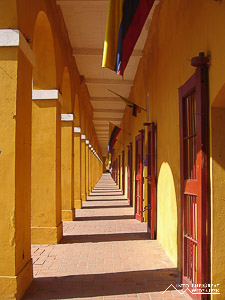
This is finally the end. After traveling about 17,500 miles I have finally come full circle and reached the exact point where I left the United States 8 months ago. Beginning in Panama I traversed every country in South America, except for Suriname and French Guyana, all via overland transportation. During the 983 hours that it took to cross these 24 borders I watched the landscapes and cities of the various countries roll by from the windows of buses, boats, trains, cars, trucks, motorcycles, and bicycles. I traveled nearly the entire stretch of the Andes from Colombia to Chile. I observed how people had shaped the landscapes through irrigation and terrace farming, and I watched how the landscapes shaped the people in the harsh environments of the Atacama Desert and the Altiplano of Bolivia. The route that I took led me through some of the more remote areas of the continent that are accessible by public transportation and I saw the stunning majestic beauty of the uncivilized terrain but I also saw traffic and garbage choked streets in Caracas and Panama City and the smog blanketing Santiago. This variety and the stark differences and contrasts made it my journey more challenging, interesting, and rewarding than following the so-called "Gringo Trail."
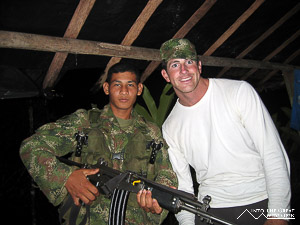
Over the course of my trip I met people from 45 different countries, 46 if you consider Greenland separately from Denmark. I have managed to learn Spanish, at least to the point where I can have in depth conversations with people, but I have also heard dozens of other languages, including the indigenous languages such as Quechua, Aymara, Guarani, and Pemon. The people that I have met over the course of my trip have been every bit as much of the attraction as the natural environment, and in some cases more. I have seen homeless people drink from puddles and eating from the trash, yet I´ve also seen people driving Ferraris and Lamborghinis, and everywhere social level in between. Through talking with the people I´ve learned more about the countries than I could have ever learned from reading the newspapers or watching television. Through them I grasped the general feeling within the countries, the shifts in politics and attitudes, but most of all the fact that regardless of where they are from, people have similar goals, aspirations, and desires.
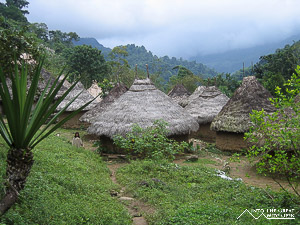
It is interesting how things changed as I became used to this different type of life on the road in foreign places. I remember arriving in Panama, unsure and uncertain about the culture, where exactly I was going, basically of unsure of everything, and speaking hardly any Spanish. I remember talking to all the other travelers to find out about other places that I was planning on visiting, to find out all the things that you can´t learn from reading a guidebook. Now, 8 months later, I find that the tables have turned, and I am the one giving advice about all the places that I have been; but such is the way of life, the student invariably becomes the teacher at some point down the line.
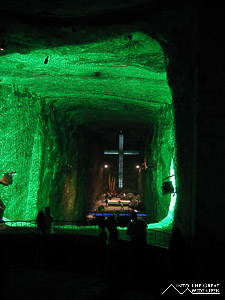
I did notice throughout my trip, and I don´t think it´s a secret, that, at least at the moment, the government of the United States is not well liked. However, no matter where I was, I was surprised to find how many people were following the events that were unfolding in the Democratic primary (not so much the Republican primary). Whether I was crossing remote borders like that between Paraguay and Bolivia or at the end of the Americas in Puerto Williams, Chile, I was asked countless times what I thought about the election and who I wanted to win. For the most part the people held no malice towards a government that they grossly disagreed with, and a government that has made it virtually impossible for all but a few of them to actually obtain visas to travel to the US. They were largely interested in a change and they too have a vested interest in closer bonds with the US and an improvement in the American economy. As unpopular as the US may be politically, American culture is all the rave, infiltrating every aspect of modern society and creating a trend in and of itself. Ironically, among the countries this is the most prevalent in Venezuela, the country with the poorest relations with the US.
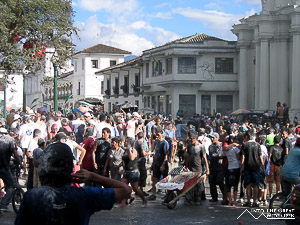
As I finished my trip in Colombia I came back to yet another big topic in South America, drugs. Between Colombia, Bolivia, and Peru the three countries supply about 80% of the world´s cocaine. My first time in Colombia I saw firsthand how cocaine is made and I met farmers who actually grow coca leaves. I saw it for sale dirt cheap on the streets from Cartagena to Cusco to La Paz, for only a few dollars a gram. In the San Pedro prison in La Paz I met several people in prison for drug trafficking, and in fact they were making cocaine inside the prison itself. In Bolivia, where the indigenous culture and harsh environment of the altiplano go hand in hand with continuous chewing of coca leaves, coca fields have been legalized by president Evo Morales. To combat the root of such a global problem the United States gave Colombia three quarters of a billion dollars in 2005, seemingly a good start. But in remote areas plagued by guerrilla warfare it is easier said than done to get rid of the coca plantations. For being so committed to curbing this problem I was appalled at the lack of security at the borders that I have crossed, many of which are known drug trafficking routes. Most of these borders are open borders with no controls at all. In fact, on the Colombia-Ecuador border there is simply a sign that pleads with people to please not traffic drugs, and from Brazil to Guyana, a major stop on the transshipment of cocaine from South America to Europe, there aren’t even any signs!
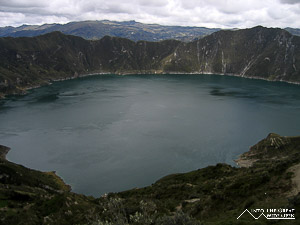
Being developing countries there is the unrelenting impression of continuous development or lack of development, depending on the country. The countries of South America run the full range from the mining wealth and modernity of Chile to self-sufficient agriculture and non-monetary lives of the people of rural Bolivia or Peru. The main thing that jumped out at me is how most buildings look like they are in some state of incompletion, whether that means they are still under construction, being repaired, or have been abandoned. In many cases it is genuinely hard to tell, but depending on the country you can make an educated guess as to which is which. I also took great interest in the contrast between neighboring countries. For example, crossing the border between Peru and Chile was much the same as crossing from the US to Mexico, likewise between Bolivia and Brazil.
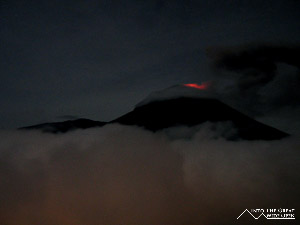
Just as my experiences traveling have been more than I could have hoped for, this very journal has expanded far beyond any implications I had for it at the beginning. So far it has been viewed thousands of times, no doubt half of those have been by my parents, but even still, I am nonetheless impressed. The scale of it has grown considerably as well, with some 73,000 words, I think it has maybe even surpassed the length of my PhD thesis; but believe me, this was certainly more interesting to write. I hope that for lack of a means to see the things that I have seen firsthand that this journal of my travel experiences will be a substitute, albeit a poor one, allowing others to get a taste of what I have seen, and maybe even inspire some to travel there on their own. When I set out on this trip I had the general idea of circling around South America but was never sure if I would actually make it, or what route I would even take. Eight months and a lifetime of experiences later I have the answers. I have seen some truly amazing things, but just as much as I have seen, I have now realized how much more there is to see. That is one of the downsides to traveling; it opens doors that you never even knew existed. That and the fact that when you are traveling you are always leaving something behind are some of the few negatives. These few negatives are certainly counteracted by what you gain by traveling. You learn about people and of the social aspects of living in a foreign environment, you learn languages and cultures, if traveling alone you learn to depend on yourself and yourself alone. In these last eight months I have learned just as much as I did during my years in graduate school, but it is a different type of knowledge and in my opinion it is every bit as useful, and in some cases more so.
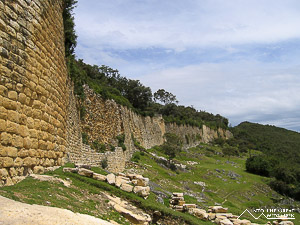
As I return home to a country and a culture that I have grown up with, I am decidedly unsure about what to expect. There are definitely things that I have missed and some things that I will miss about the places that I have left behind. Over the last eight months I have grown accustomed to the new foods, cultures, and customs of the countries in South America. While many things are similar enough, others are totally foreign. And while I have learned enough Spanish to get by and understand if not everything, at least the gist of things, perhaps what I am most looking forward to is to just going home to a place and a culture that I know, to a familiar place where I don´t feel like a foreigner. Despite the parallels between American society and those of the South American countries, I feel that the differences are distinct and as I return home and look towards starting a new life and a new job in a new location I will come face to face with those differences. From my time here in South America I feel that the cultures there are much more family oriented and the working environment much less cut-throat and competitive. But in many ways I have been gone so long and am now looking at things from a different perspective that it´s hard to tell if my impressions are truly accurate.
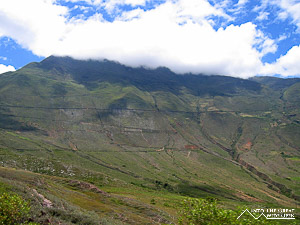
I have heard some people say that traveling for such extended periods of time changes you. I know that at least physically that´s true, having grown my hair for five months and then finally cut it, and having lost a good amount of weight from a different diet, daily activity, and no trips to the gym. Besides that it is hard to say since you can´t actually ascertain whether you´ve changed because you can´t look at yourself from an unbiased and independent point of view. For that answer I´ll have to wait for the judgement of others after I return home. To me, it seems logical that you can´t live a completely different lifestyle in totally foreign countries without that changing you in some way or another. At the very least I have returned a more diverse person with broadened horizons and a better understanding of a continent I had only previously read about in books and magazines. Having seen what many other people in drastically different positions expect and get out of life, perhaps I will have a better understanding of my own expectations and what I should be looking for. This could be an invaluable lesson as I return home to contemplate a new life and career. However, as I am on the verge of yet another new beginning, I can´t help but keep one eye on the future and think about where my next travels will take me, and when that will be.













































































































